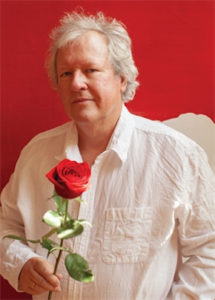Love on the beat
by Brett MarieSinger Roxanne Fontana tells a story about her first visit to New York’s CBGBs nightclub in the fall of 1976. Having read in a music magazine about the bourgeoning rock scene on the Bowery in Manhattan, Roxanne took a subway into the city and visited the club in the middle of the day (being underage, she assumed she couldn’t get into the place at night). She’d come to buy the compilation album of music by the various bands that regularly played there, a record which at the time was only available at the venue itself, on their own new record label. But she stuck around to chat with the friendly owner for a little while after getting what she’d come for, and at some point before she left, one of the staff played an unfamiliar song on the jukebox.
The frenetic bass and driving rhythm that pulsed out at her that day, overlaid with choppy guitar and the singer’s nervous, rambling voice, was something called ‘Psycho Killer’, by a band named Talking Heads. For Roxanne, who had to deal with bombast from the likes of ELP and Yes on New York radio every day, this music was a welcome change, something new, and exciting, and different. The Animals’ ‘We Gotta Get Out of This Place’ immediately followed on that CBGB jukebox, validating to her that the previous song was cool.
This simple story of finding such viscerally electrifying music brings a smile to her face to this day. It’s one of those anecdotes I can hear over and over, the kind which, if I sense a conversation drifting in the right direction, I might steer her into telling again, just to see that little spark appear in her eyes.
This same electricity courses through much of Talking Heads drummer Chris Frantz’s new memoir Remain in Love. In the forty-some years since he formed Talking Heads with frontman David Byrne and bassist Tina Weymouth, Frantz has amassed a vast repertoire of stories, and he tells them with the vigour of a man still buzzing from all of those adventures.
Frantz states his mission plainly at the outset, promising “the true inside story” of his life as a musician, first for Talking Heads and then for Tom Tom Club, the group he formed with Weymouth as Talking Heads began to splinter. True to his word, he proceeds to blast through the highlights of a life and career that took him from his birthplace in Fort Campbell, Kentucky, to the grimy musical Petri dish of seventies New York City, and onward to concert stages and recording studios the world over. Across 366 pages, Frantz offers a drummer’s-eye view of dozens of scenes, onstage, backstage, on tour buses and aboard yachts, in recording studios and control rooms, with vignettes involving all manner of rock royalty and other cultural heroes he’s had the pleasure of encountering (Lou Reed, Andy Warhol, James Brown, to name just three). You might call his life charmed, and he clearly would agree; more than once along the way, he pauses to reflect on how far he’s come. At these points I find myself pausing as well, to admire how well his memory and eye for detail have held up along the way.
If the language feels unadorned, it’s still more than capable of capturing the spirits of the story’s various players. Frantz’s endless, breathless variations of ‘the audience went nuts’ take on the quality of a mantra.”
Having studied at the Rhode Island School of Design before becoming a musician and producer, Frantz is an artist in every sense of the word. His in-depth knowledge of visual arts and music, right down to the elements of production and even album cover design, lend his stories and opinions an element of sophistication that set the book apart from other rock ‘n’ roll memoirs. I will concede that the author’s sentence-level prose doesn’t rise to the same level of sophistication, and I can see this as an opening for a harsher literary critic than me to go on the attack. But there’s something to be said for the unabashed ebullience that Frantz’s guileless writing is able to convey. If the language feels casual, unadorned, it’s still more than capable of capturing the spirits of the story’s various players. Consider a sentence that boils two iconic bands to their essences, as Talking Heads, on an early tour of Europe with fellow CBGB alumni the Ramones, roll through France for the first time: “It was April in Paris, and we had the day off, so Tina, David, Jerry [Harrison], and I decided we would explore while the Ramones went to McDonald’s.” And as the two bands storm across the Continent, Frantz’s endless, breathless variations of “the audience went nuts,” take on the quality of a mantra, gaining rather than losing their punch.
If even my defence of it makes his writing sound repetitive, Frantz’s unwavering enthusiasm for his music – and for the bandmate who becomes his wife early on – somehow never gets old. More than once, an account of a concert becomes a paragraph-long PDA as Frantz watches Weymouth perform from his drummer’s throne (“the best seat in the house”). Chapter One sets the tone as Talking Heads play a European gig in 1980: “On this December night in Rome, I was feeling my love for our band and especially for Tina… She shimmied and bopped and played with a master’s authority.” In another, similarly inspired passage, Talking Heads play a gospel-infused ‘Take Me to the River’ as an encore at a Toronto music festival: “As I played this wonderful song and looked over at Tina, I felt a more powerful love than ever before for her and a touch of the divine in my own heart.” Remain In Love is entirely suffused with Frantz’s love for his darling Tina, who becomes his partner in life and art from almost the moment she appears on his college campus in 1971, riding past him on an old bicycle, “as in a scene from a Truffaut movie.”
And at Frantz’s prompting, it’s through the lens of François Truffaut, the French New Wave auteur, that I can zoom in on the reason I enjoy the drummer’s adventures so thoroughly. Truffaut captivated audiences with his semi-autobiographical feature The 400 Blows, and the movie’s fourteen-year-old protagonist Antoine Doinel (utterly inhabited onscreen by actor Jean-Pierre Léaud) returned four more times as he fumbled his way into adulthood and beyond. There’s not much in the backstory of the neglected young petty thief with a Balzac obsession to connect Antoine with Frantz. And I’d hardly call Frantz hapless, as the awkward Antoine usually ends up as he schemes his way through life. But the mind makes connections where it wants them, and there’s a certain quality to middle-aged Frantz’s tone on the page, one that recalls Antoine in the last of the Doinel films, 1979’s Love on the Run. Scenes come to mind of the thirty-something Antoine, sprinting rather than walking from place to place, as Frantz tears from one event to the next, trying to take us to every last corner of his memory. I can picture Frantz reading aloud from his book with the same intensity Antoine projects when telling a story from his own autobiographical novel.
It’s a romantic heart that these two men share, and as Frantz reflects on his decades of making music, and on the love affair that has lasted all of that time, my mind flashes to Antoine winning the heart of Sabine, Love on the Run’s love interest, and I hope Antoine’s happy ending can last as long as Frantz’s has. Describing Love on the Run at the time of its release, Truffaut used terms that could just as easily describe Frantz and his book today: “Antoine is still in love and because he is still in love, he is still alive.” Remain in love, indeed.
 Chris Frantz founded Talking Heads with David Byrne at Rhode Island School of Art & Design in the mid 1970s. Alongside bassist Tina Weymouth, he is one half of a rhythm section that is widely thought to be up there with the very greatest in rock and pop history. Remain in Love is published by White Rabbit in hardback and eBook,
Chris Frantz founded Talking Heads with David Byrne at Rhode Island School of Art & Design in the mid 1970s. Alongside bassist Tina Weymouth, he is one half of a rhythm section that is widely thought to be up there with the very greatest in rock and pop history. Remain in Love is published by White Rabbit in hardback and eBook,
Read more
tomtomclub.com
@ChrisFrantzTTC
Author portrait © James Swaffield
Brett Marie, also known as Mat Treiber, grew up in Montreal with an American father and a British mother and currently lives in Herefordshire. His short stories and other writing have appeared in publications including The New Plains Review, The Impressment Gang, PopMatters and Bookanista, where he is a contributing editor. His debut novel The Upsetter Blog will be released in Autumn 2021.
Facebook: Brett Marie
@brettmarie1979


